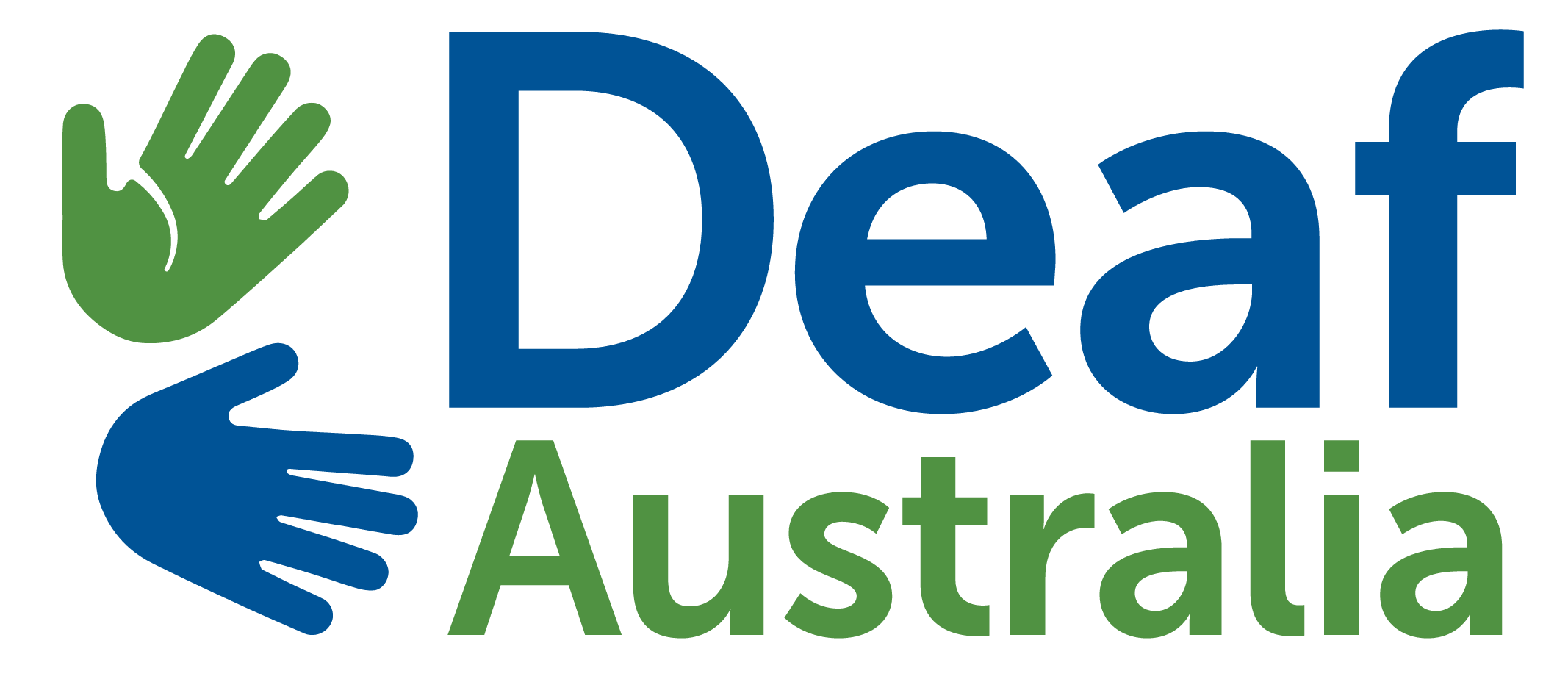No products in the cart.
Deaf Australia is always a hive of activity, busy with all sorts of tasks; working hard to make life better for Deaf people. Read more here about what we’ve been up to lately.
[divider style=”hr-dotted”] [accordion_set] [accordion title=”Key Priority 1: Early intervention and education” active=”yes”]National Summit on Early Intervention & Education for Deaf & Hard of Hearing Children, Canberra, 29 & 30 November 2012
FaHCSIA has sent us feedback on the report from the summit and has requested some changes. We are now waiting for our colleagues at Grant Thornton to make changes. We continue to hope to be able to send the final report out soon.
Early Intervention Working Group
I attended a meeting of this group on 23 April. One of the things the group is discussing is the development of early intervention protocols, i.e. what elements a good early intervention program must have. In preparation for this we are looking at similar documents from overseas.
A member of the Working Group is working on mapping early intervention services in Queensland – i.e. documenting what services are available and in what locations. At a previous meeting she provided some information about this to the group. During April I sent her some feedback on the importance of ensuring that the availability or absence of Auslan/bilingual early intervention services is clearly included in the documentation along with speech and auditory therapy services.
Inquiry into the TAFE system
The House of Representatives Standing Committee on Education and Employment announced an inquiry into the TAFE system in March. TAFE plays a very important role in the education of people who are Deaf so it was important that we send in a submission. We sent out a request for feedback from the community and received a lot of very valuable information which we then used in our submission to the inquiry, sent on 18 April. Many thanks to those who sent us their comments, with special thanks to those people who agreed to have their stories included as case studies. At some point the Committee will make our submission available on its website and you will be able to read it by clicking here.
Employment
The Department of Education, Employment and Workplace Relations (DEEWR) held a ‘Consumer Day’ in Canberra on 30 April, which I attended along with representatives from other peak disability representative organisations.
In preparation for this I sent out a request for feedback from the community about their experiences and views of the new Disability Employment Services (DES) system. Many thanks to those who sent in feedback; it was very helpful.
At the meeting, DEEWR provided us with a lot of information about the new arrangements for DES and it became clear that a great deal of information that DES consumers should be getting is not actually reaching them. DEEWR agreed to provide information in a more simple and easy to understand format and we agreed to help them by making this information available to our members.
As an example of information that consumers generally do not seem to be aware of, DES providers are required to use their DEEWR funds to cover any support costs a client needs in the Employment Pathways (pre-employment) stage as well as the interview and employment stages. This means that if you are a Deaf person and you want to, for example:
- do a training course relevant to your Employment Pathways plan but the training organisation is small or privately owned and won’t provide interpreters, or
- do some work experience or volunteering
then the DES provider has enough funds to provide interpreting. It also means that if you go to a generalist (i.e. not Deaf specific) DES provider and you need an interpreter the DES provider does have enough funds to pay for a qualified interpreter for their meetings with you; it is not acceptable for them to say they don’t have the funds or for them to use unqualified interpreters or staff who ‘can sign’ but are not sufficiently fluent in Auslan for your needs.
This information is clearly set out in the Code of Practice and Service Guarantee that all DES providers have signed up to. You can ask your DES provider for a copy.
Several of us raised the issue of there now being fewer specialist DES providers. For Deaf people this means more Deaf people have to go to generalist (not Deaf specific) DES providers. DEEWR said that many specialist providers were very good at understanding the needs of their clients but were not successful enough at finding them jobs. They showed us some statistics from their database that showed that only about 20-30% of consumers who have received services from DES providers have been placed in jobs. This is a very low success rate.
Many people have said to us, and we have said many times to DEEWR, and said it again at the Consumer Day, that the $6,000 per person per year cap on interpreting from the Employment Assistance Fund (EAF) is not enough for some people. DEEWR seems to disagree, and they later sent me some information from their databases showing that the average amount spent on interpreting per EAF registered Auslan user (who is in a job) per year is $2,408. I need to talk more with DEEWR about this; averaging it out like this is not particularly the best approach as interpreting needs vary greatly between jobs and people. But it does seem to indicate that although we know the $6,000 cap is not enough for some people, it is more than enough for many. We need more research on this issue. [/accordion] [accordion title=”Key Priority 3: Access to information and media” active=”no”]
DisabilityCare Australia (NDIS)
In April we worked on the planning for a series of general awareness raising workshops about the NDIS in as many locations (including regional locations) as we can fit into the time available up to 30 June 2013. I will be out of the office a lot in May and June doing workshops in the community. These workshops are specifically for Deaf people and will be in Auslan. No interpreting will be provided – however, please let us know if you need a deafblind interpreter. Please keep an eye out for the information announcing locations and dates and check the Outlook blog entry. And please come along to a workshop; the NDIS will bring big changes for Deaf people, and it is important that we are all prepared for these changes.
DDA Transport Standards
The Australian Federation of Disability Organisations (AFDO), of which Deaf Australia is a member, prepared a submission to the Review of the DDA Transport Standards. We sent comments about Deaf people’s needs to AFDO for inclusion in their submission. [/accordion] [accordion title=”Key Priority 4: Organisational stability and growth” active=”no”] Emeritus Professor Des Power AM, died on 3 April, aged 77. Des Power was well known around the world as an educator and academic in the field of Deaf Education. He was also a consistent ally of Deaf Australia and a long-time supporter of Deaf people and their aspirations for more access and opportunity. He will be greatly missed by many including those of us at Deaf Australia who knew him well. Deaf Australia life members Breda Carty and Robert Adam collaborated on a wonderful obituary for Des from the point of view of Deaf people who knew him. You can see this obituary by clicking here.
Partnerships:
Deaf people from NESB/CALD backgrounds
On 16 April I met with the CEO of AMPARO – a Queensland advocacy organisation for people with disabilities from NESB/CALD backgrounds. AMPARO wants to work with us on a special project for families of Deaf people to learn Auslan. We will be talking further with them and with NEDA, the national organisation for this group of people.
World Federation of the Deaf
In April the WFD asked us to recommend a number of interpreters to possibly interpret at a meeting of the UN Convention on the Rights of Persons with Disability committee in Geneva in September this year. This meeting will discuss Australia’s report on its compliance with the UNCRPD. Deaf Australia does not have the resources to do a full scale formal recruitment process of interpreters, and we are already familiar with interpreters working at this level so we approached suitable interpreters directly and sent information to WFD.
Board member Ida Rogers has continued to work on arrangements for youths and youth leaders to attend the WFD Junior Youth Camp in Rome in July this year. We will now have two youths attending – Max Eyking and Anabelle Beasley. They will be accompanied by a youth leader, Shirley Liu. [/accordion] [/accordion_set]
[content_box style=”green” title=”About the contributor”] Karen Lloyd AM is Executive Officer of Deaf Australia. [/content_box]


